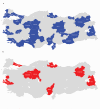Respiratory syncytial virus (RSV) infections in adults: Current trends and recommendations for prevention - a global challenge from a local perspective
- PMID: 40530658
- PMCID: PMC12184840
- DOI: 10.1080/21645515.2025.2514357
Respiratory syncytial virus (RSV) infections in adults: Current trends and recommendations for prevention - a global challenge from a local perspective
Abstract
Respiratory syncytial virus (RSV) is a leading cause of lower respiratory tract infections (LRTI) and a major health threat especially for children and older adults. Epidemiological data reveal that RSV-associated global mortality rates in individuals aged ≥ 70 years exceeded those in children aged < 5 years in 2019. Although effective interventions have decreased RSV-related deaths in children aged < 5 years over time, RSV appears increasingly significant issue for the elderly and adults with underlying health conditions. Furthermore, there is currently no specific treatment for RSV infections in adults, highlighting the importance of prevention. Recently, three vaccines (RSVPreF3, RSVpreF, and mRNA-1345) have been approved for adults to date. In this article, we aimed to review the characteristics of RSV infections in adults and the evidence on the safety and efficacy of RSV vaccines, with a glimpse of the current situation in Türkiye- one of the low- and middle- income countries (LMICs).
Keywords: Respiratory syncytial virus; adult; influenza like illness; low- and middle- income countries; lower respiratory tract infections (LRTI); preventive medicine; severe acute respiratory infection; vaccines.
Plain language summary
Respiratory syncytial virus (RSV) is a virus that can cause serious lung infections. It has long been considered as a child illness; however, RSV can cause serious illness in older people and in people with long-term health problems like heart or lung disease. Among the high-risk adults, RSV can result in severe diseases, hospitalizations, and even death. Today, there is no cure for RSV in adults, so prevention is the cornerstone of protecting people at risk. Three vaccines have been approved that can protect older people and people with chronic medical conditions. This review article provides information on the characteristics of RSV infections in adults, available RSV vaccines and their role in preventing RSV. Adding the available vaccines against RSV to regular adult vaccination programs can save lives, keep people out of the hospital, and protect older adults and those with long-term health problems.
Conflict of interest statement
Mine Durusu Tanriover has received honoraria from Sanofi Pasteur, Pfizer, Abbott, GSK, MSD for consultancy and scientific presentations and has no conflict of interest directly related to this work. Alpay Azap has received honoraria from Pfizer, GSK, Astellas, MSD for scientific presentation and has no conflict of interest directly related to this work. Hasan Selcuk Ozger has received honoraria from Pfizer for consultancy and lectures. Abdullah Sayiner has received honoraria from Pfizer, GlaxoSmithKline, Abbott and Sanofi for consultancy and lectures. Oldac Uras Dursun and Seyhmus Merter are the employees of Pfizer Inc. Ebru Cakir Edis, Husnu Pullukcu, and Meliha Cagla Sonmezer report there are no competing interests to declare.
Figures

References
-
- Haynes AK, Manangan AP, Iwane MK, Sturm-Ramirez K, Homaira N, Brooks WA, Luby S, Rahman M, Klena JD, Zhang Y, et al. Respiratory syncytial virus circulation in seven countries with global disease detection regional centers. The J Infect Dis. 2013;208(Suppl 3):S246–54. doi: 10.1093/infdis/jit515. PMID: 24265484. - DOI - PubMed
Publication types
MeSH terms
Substances
LinkOut - more resources
Full Text Sources
Medical
